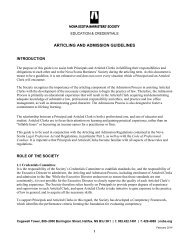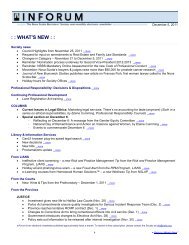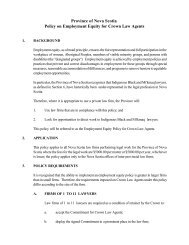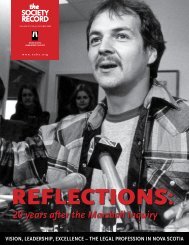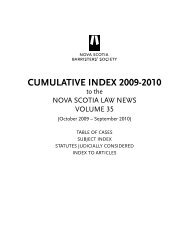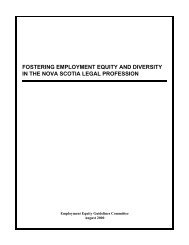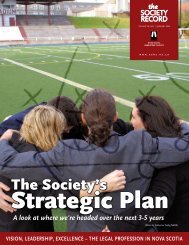SR Vol 25 No 1, January 2007 - Nova Scotia Barristers' Society
SR Vol 25 No 1, January 2007 - Nova Scotia Barristers' Society
SR Vol 25 No 1, January 2007 - Nova Scotia Barristers' Society
Create successful ePaper yourself
Turn your PDF publications into a flip-book with our unique Google optimized e-Paper software.
A Smart PartnershipDuring the past summer, the Law Reform Commission of<strong>No</strong>va <strong>Scotia</strong> initiated a collaborative access to justice projectwith Saint Mary’s University to examine the workings of theSmall Claims Court.The Small Claims Court was established in 1980 as a result of recommendationsfrom the Commission’s predecessor, the <strong>No</strong>va <strong>Scotia</strong>Law Reform Advisory Commission. The Court was established inorder to provide <strong>No</strong>va <strong>Scotia</strong>ns with an informal, inexpensive, andspeedy means of having their disputes resolved without the necessityof a lawyer. The increasing inaccessibility of the civil justice system in<strong>No</strong>va <strong>Scotia</strong>, and all other jurisdictions in Canada, has provided thestimulus for this project.Concerns about access to justice in Canada are not new. Indeed, theCanadian Bar Association published a report on civil justice systemsin Canada 10 years ago in which it highlighted the emerging crisis inthe civil justice system, with its increasing costs, delays and complexity.While many of the problems afflicting the civil justice system wereclearly recognized, the almost complete absence of empirical data was,and continues to be, a real impediment to understanding the underlyingcauses of these problems. Ten years later, and notwithstanding thehuge amounts of money expended on the civil justice system, there hassince been very little empirical research conducted in Canada. Duringthis time, we have also seen a very significant increase in the number ofself-represented litigants in the courts at all levels.It is against this background that the Commission decided that therewould be merit in examining the workings of the Small Claims Courtfrom the perspective of two questions. The first relates simply to thequestion of how well the Court is doing in relation to its originalmandate. The second has to do with whether the civil justice systemat large might usefullylearn – and perhaps even John Briggsadopt – something from Executive Director & General Counselthe workings of the Small Law Reform Commission of <strong>No</strong>va <strong>Scotia</strong>Claims Court.The first stage of the project has involved a series of structured interviewscarried out by social scientists who have a particular interestin psychology and the law. Interviews have been conducted withthe excellent cooperation and participation of Small Claims Courtadjudicators, court administrators, and lawyers who appear in theSmall Claims Court. Those interviews are nearing completion andthe results will soon be collated and analyzed. It is expected that theinterviews will not only provide interesting and valuable informationabout the workings of the Small Claims Court, but also help informthe development of an extensive questionnaire - to be administered toSmall Claims Court users during the second stage of the project.This project is somewhat unusual for the Commission. Generally, theCommission undertakes a project related to an area of the law that it isbelieved may require some reform. This project does not presume thatthere is anything wrong with the workings of the Small Claims Court.<strong>No</strong>netheless, it is hoped that the work of this project will contribute insome way to a better understanding of how the Small Claims Courtworks, and ultimately, that it might lead to improvements not only inthat Court, but perhaps in the civil justice system at large.Established by legislation in 1990, as an independent provincial agency, the LawReform Commission is mandated by statute to review <strong>No</strong>va <strong>Scotia</strong> law and makerecommendations for its improvement, modernization and reform.<strong>January</strong> <strong>2007</strong> 29



